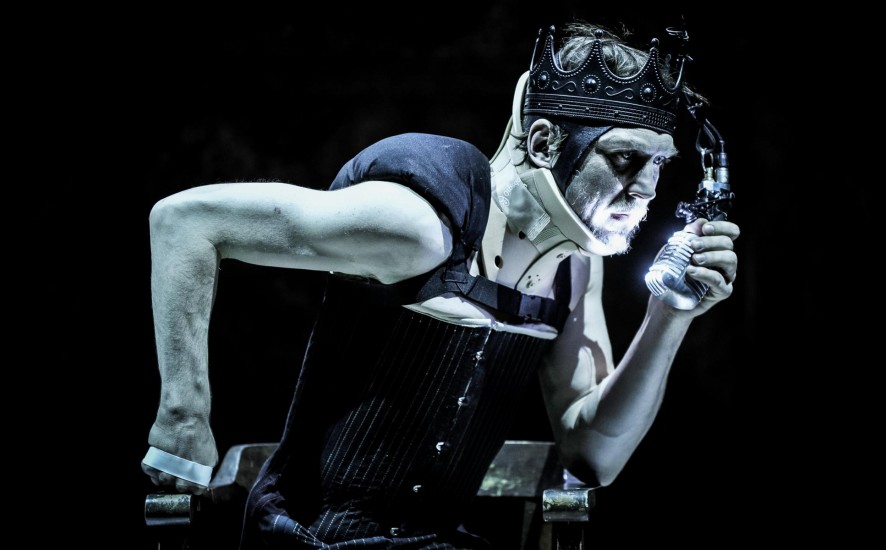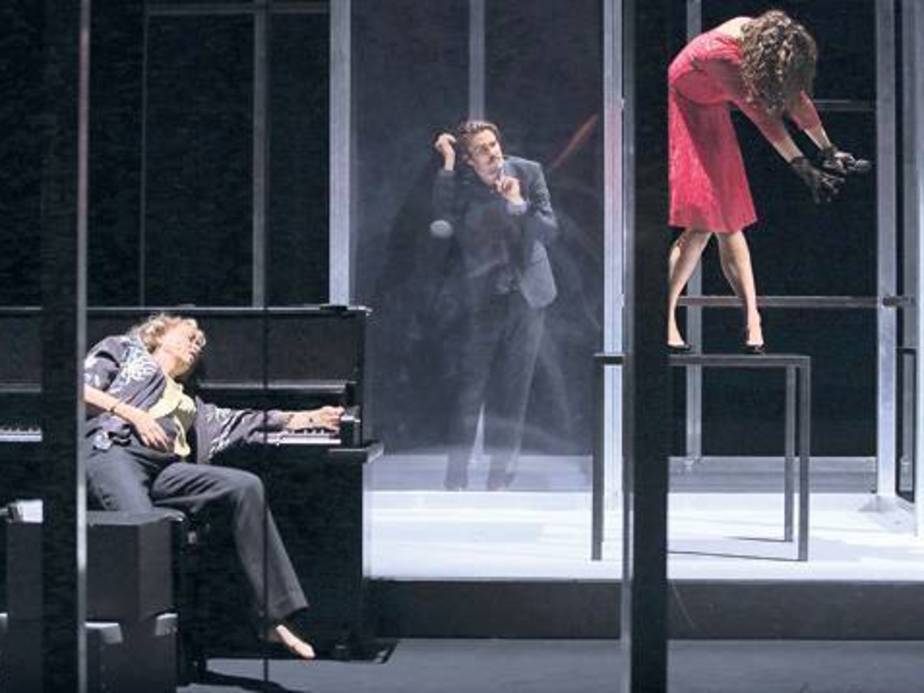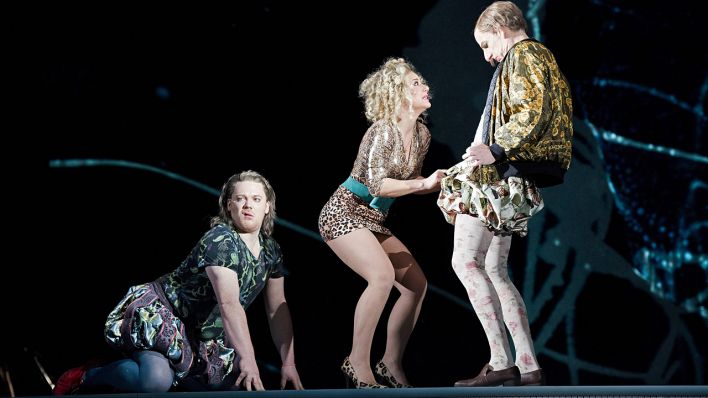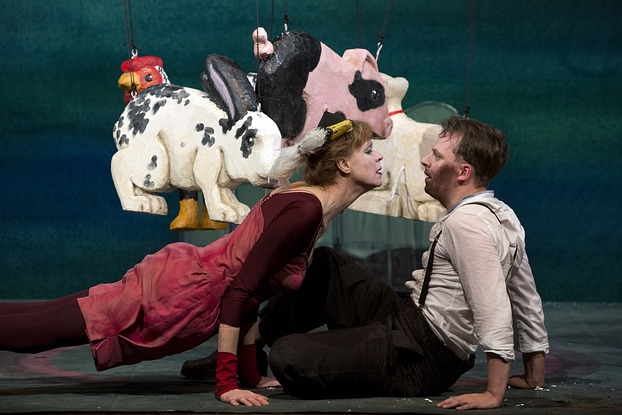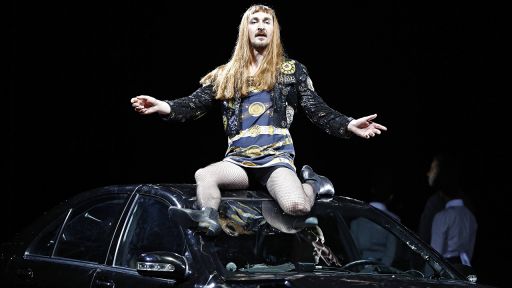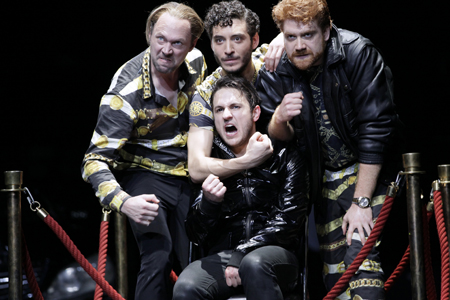Berlin is a city of cranes. Giant cantilevered arms hover over the skyline like H.G. Wells’ Martian war machines, still engaged in rebuilding what was bombed out in World War II or, in East Berlin, largely neglected until the Wall came down in 1989. I’d last seen Berlin in the partitioned days of Checkpoint Charlie, and the city wears its ongoing resurgence proudly. Gleaming glass-and-steel office towers stand cheek by jowl with medieval churches and Prussian-era office blocks.
When I revisited Berlin this spring, I got the same hybrid feeling from the theaters I attended. The five shows I saw at the city’s four leading ensemble-based repertory companies leaned insistently forward, but with at least one foot still planted in the past.
By “past” I don’t mean that these long-established institutions were serving up Schiller and Goethe in period costumes. No, even their mainstage productions were adventurous, postmodern deconstructions of conventional dramatic forms, but for the most part they displayed the kind of audacity that was adventurous in New York and Paris 20 years ago – and indeed, in some ways, in Weimar Berlin of the 1920s.
Mind you, the fact that these theaters are not doing Schiller in fancy dress is indicative of the artistic hive the city has become. It’s now a haven for young artists who have been priced out of London and Paris, and I imagine the dramatic envelope is being actively shredded in some of the city’s dozens of fringe venues.
Though each company seems to have its own “house style,” all the shows I saw shared a surprising number of stylistic features. All five had basic or no sets; eclectic, anachronistic costuming, most of it thrift-store funky; scraps of English peppering the German text; snatches of American pop songs; and with one exception, video projections and loud electronic incidental music.
All benefitted also from a theatergoing culture that has no curtain speeches applauding sponsors (thanks to a government that values and supports the arts), no admonitions to silence cell phones (though none went off during any performance I saw), no intermissions (though most of the performances ran over two hours) and no standing ovations, but instead, sustained applause that called the cast back onstage up to half a dozen times – such a refreshing escape from our own perfunctory standing O’s, which peter out before the actors are even back in the wings.
All the plays were performed in German, which I speak little and understand less. But two of them were Shakespeares I’m familiar with and two were augmented by English-language supertitle projections.
The first show of my theatergoing week set the bar for those that followed. It was Richard III at the Schaubühne, established in the sixties and still wearing the hallmarks of that unruly era. 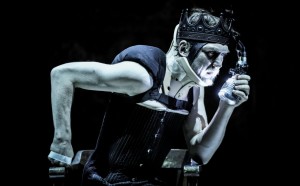 The very first scene of Thomas Ostermeier’s production set the bitterly antic tone and fierce momentum that carried through a breathless 160 minutes.
The very first scene of Thomas Ostermeier’s production set the bitterly antic tone and fierce momentum that carried through a breathless 160 minutes.
It began with a giddy cocktail party, music tinkling and confetti guns showering the merrymakers with silver tinsel while the “deformed, unfinished” Richard slunk among them like a barely tolerated pet monkey.
Richard was the protean Lars Eidinger, wearing a t-shirt that barely concealed his hump – a fabric pillow strapped to his shoulder – and speaking his first lines into a microphone dangling over the stage on an elastic cord: Nun ward der Winter unsers Mißvergnügens… – raking the audience with a conspiratorial grin, making us all partners in the crimes he’s about to set in motion.
At the end of that famous monologue, he launched into it again in English – “Now is the winter of our discontent…” – before breaking off as the PA system, accompanied by an onstage drummer, blared out Tyler the Creator’s megarap “Yonkers,” with Richard taking up the refrain: “I’m a fucking walking paradox – no I’m not…”
And it went on from there – not even the weirdest, but certainly the most viscerally exciting, continually astonishing piece I saw in my week of Berlin theater.
The next night, on the Schaubühne’s other stage, I saw a brand-new play, Never Forever, a guest production by the dance-theater troupe known as Total Brutal. Translations of the dialogue were projected on the back wall, but they weren’t entirely necessary, as most of the action spoke for itself: vignettes illustrating human isolation in this hyper-connected age.
Boxed into dark steel frames, an agile ensemble enacted illustrations of the theme: 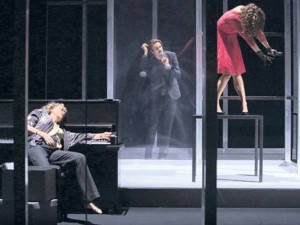 A man talking to a chair, practicing the speech he’ll use to break up with his girlfriend, because he “can’t stand the intimacy.” A woman on the phone with her lover, whom she never actually sees in person. A man who says he’s incapable of having a live conversation because “I can’t cut or edit.” A woman imagining herself “a YouTube star,” alone in her bedroom belting an excruciating “I Will Always Love You.”
A man talking to a chair, practicing the speech he’ll use to break up with his girlfriend, because he “can’t stand the intimacy.” A woman on the phone with her lover, whom she never actually sees in person. A man who says he’s incapable of having a live conversation because “I can’t cut or edit.” A woman imagining herself “a YouTube star,” alone in her bedroom belting an excruciating “I Will Always Love You.”
The dance part of this dance-theater piece came in frantic, thrashing movements illustrating repressed frustrations born of self-inflicted physical and emotional solitude. And while the vignettes ranged from naturalistic to almost surreal, with some moments reaching a sharp poignancy, for me this too-literal selfie of disconnected lives was the victim of its own theme, and in the end, failed to connect.
The Deutsches Theater is the oldest of Berlin’s ensemble companies. Its main auditorium, built in 1850, features a zodiac-frescoed ceiling and gilded medallions adorn the stage boxes. But the production I saw went farther down the pomo path than either of those at the Schaubühne.
The play was Was ihr wollt – “What you will” – in other words, Twelfth Night. While it’s clear that all these companies have been touched by the rise of what the German critic Hans-Thies Lehmann has dubbed “postdramatic theater,” none of them, from what I saw, have gone as far as, say, The Wooster Group in New York. But this show approached it with a tentative decoupling of text and action.
Eight actors played all the parts in Shakespeare’s cross-dressing comedy of disguise and identity confusion. The actress playing shipwrecked Viola was also her twin brother Sebastian, and Duke Orsino, who Viola falls for, doubled as Antonio, the seaman (in a Popeye t-shirt) who’s in love with Sebastian.
An enormous raised turntable nearly filled the theater’s expansive stage, making for quick, overlapping scene transitions. Semi-abstract underwater images filled the back wall, and Orsino could often be seen floating above the action in a small bathysphere. 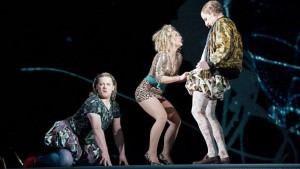 The plays’ three mischief-makers were semi-contemporary barflies: Maria the barmaid a gum-chewing, miniskirted bleached blonde; Andrew Aguecheek fey and foolish in t-shirt and tights; and drunken Toby Belch sipping umbrella drinks from a half-coconut. Their partner in crime, Feste, was a fireplug of a woman with a maniacal leer and a tin drum (shades of Günther Grass).
The plays’ three mischief-makers were semi-contemporary barflies: Maria the barmaid a gum-chewing, miniskirted bleached blonde; Andrew Aguecheek fey and foolish in t-shirt and tights; and drunken Toby Belch sipping umbrella drinks from a half-coconut. Their partner in crime, Feste, was a fireplug of a woman with a maniacal leer and a tin drum (shades of Günther Grass).
This was the angriest Twelfth Night I’ve ever witnessed. An unshaven, hungover Orsino delivered his opening “If music be the food of love” monologue as a pissed-off rant, as did Sebastian just after couching with the Lady Olivia, and the mock imprisonment of the haughty steward Malvolio turned physically violent. The gender confusion theme was not only resolved but inflated in a video finale in which the entire cast was doubled, breasts sprouting from the men and penises dangling from the women.
The only one of the five companies I was already familiar with was the famed Berliner Ensemble, founded by Bertolt Brecht in 1949 in East Berlin and still devoted to his works and his meta-theatrical aesthetic. In the company’s small Pavillon theater, across a rather dingy courtyard from the main building, a piece of Brecht juvenilia was receiving its professional premiere.
Hans im Glück (Hans in Luck) is a fanciful riff on a Grimm Brothers tale that’s very popular in Germany but little known elsewhere. A kind of Jack and the Beanstalk in reverse, it’s the story of Hans, a gullible simpleton who starts with a lump of gold and keeps trading down – for a horse, a cow, a pig, a goose and finally a heavy grindstone that falls into a well, freeing him of his burden: What luck!
Before the performance I descended a half-flight of stone steps at the back of the courtyard to the company canteen, where I had a pre-show dinner of thick potato soup and crusty bread – just the meal Mother Courage would have served from her own traveling canteen. At an adjoining table, actors in dressing gowns and makeup were fortifying themselves for the evening’s performance with sausages and beer.
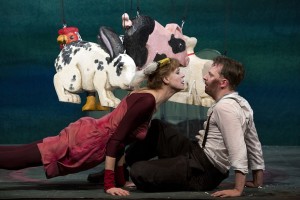 The carnivalesque production was performed on a small bare stage by an energetic ensemble of eight, most of them in multiple roles, with incidental music (acoustic, for a change) by an multi-instrumental duo. This was the show with no supertitles, but I could follow the action in a general way. In Brecht’s cynical hands, Hans becomes a tippler with an unfaithful wife and his hapless journey a series of encounters with animal-headed charlatans and seducers, including a trio of slapstick gangsters, a flirty flapper and a randy carousel-keeper played as an homage to Brecht and Weill’s leading lady, Lotte Lenya.
The carnivalesque production was performed on a small bare stage by an energetic ensemble of eight, most of them in multiple roles, with incidental music (acoustic, for a change) by an multi-instrumental duo. This was the show with no supertitles, but I could follow the action in a general way. In Brecht’s cynical hands, Hans becomes a tippler with an unfaithful wife and his hapless journey a series of encounters with animal-headed charlatans and seducers, including a trio of slapstick gangsters, a flirty flapper and a randy carousel-keeper played as an homage to Brecht and Weill’s leading lady, Lotte Lenya.
Like the Berliner Ensemble, the Maxim Gorky Theater was established as an explicitly political theater in the Soviet-controlled sector of partitioned Berlin. Named for the Soviet writer and founded in 1952 with a mission to be “both critical and dissident,” it’s perhaps the most insistently topical of the city’s major venues.
The show I saw was Der Untergang der Nibelungen: The Beauty of Revenge – yes, a bilingual title, in a theater where every production is supertitled in English. It was a cheeky deconstruction of Friedrich Hebbel’s 1862 drama Die Nibelungen, based on a medieval poem that was also the basis of Wagner’s Ring cycle.
Hebbel’s original, detailing a cycle of betrayal and revenge afflicting the rotating owners of a golden hoard, is set in a feudal landscape dotted with castles, 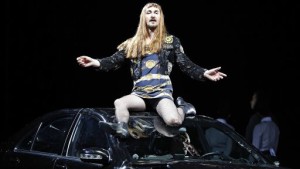 but Sebastian Nübling’s production took place in and around a battered black Mercedes coupe. The heroic Siegfried and his pals were self-regarding leather boys and the beauteous Brunhild a muscular dude with a long auburn mane. A quartet of household staff – a black French butler in a skirt and a trio of maids in trousers – crooned a tone-deaf rendition of “Falling in Love is Wonderful.”
but Sebastian Nübling’s production took place in and around a battered black Mercedes coupe. The heroic Siegfried and his pals were self-regarding leather boys and the beauteous Brunhild a muscular dude with a long auburn mane. A quartet of household staff – a black French butler in a skirt and a trio of maids in trousers – crooned a tone-deaf rendition of “Falling in Love is Wonderful.”
The program notes said the play “explores recent German history as a suicide attack,” and near the end that was made explicit. With most of the characters dead, we heard the last man standing declare, in a smirking parody of Angela Merkel and others’ anodyne pronouncements on Europe’s financial turmoil, “We have come out of this crisis stronger than before.” That got a knowing laugh from the audience, and was soon followed by the prolonged, multi-bow curtain call I’d come to expect from these stimulating theaters in Europe’s emerging cultural hub.
If you’d like to be notified of future posts, email StageStruck@crocker.com

